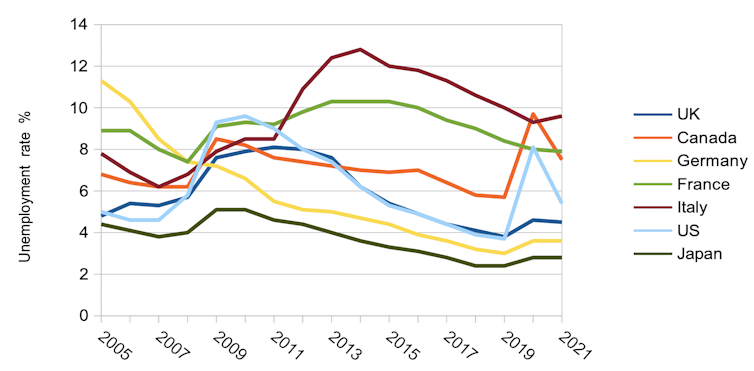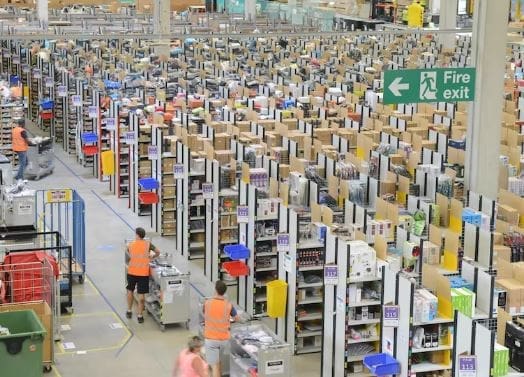The strikes by hundreds of Amazon workers at the company’s Coventry warehouse in the English Midlands have brought into relief some of the problems of work in today’s high-tech society.
While primarily focused on pay, the workers are pushing back against long hours and an automated surveillance system that times how long they take to do each task, as well as going to the toilet. It all contributes to a high pressure and intensive work environment – plus more accidents.
We have much to learn from this painful situation about the future of work and technology. On the one hand, Amazon’s whole employment model goes against the general assumption that technology destroys jobs. Equally, however, the company’s employment practices show how automation can make workplaces oppressive, forcing workers to become more like robots.
Pessimistic predictions about the threat to jobs from technology are nothing new. One frequently cited study published in 2013 predicted that up to 47% of jobs in the US would be removed by automation over a 20-year period. Now that we’re halfway through that period, jobs in the US remain plentiful and unemployment is low. Similarly, there’s evidence from Germany that the use of robots has had no effect on total employment.
Across the G7 as a whole, employment has been holding up well. Aside from a COVID blip, unemployment has generally been falling for the past decade in spite of automation and robotics gradually becoming more important to workplaces. The reality is that paid employment has been surviving bouts of technological progress for centuries.
G7 unemployment rates 2005-21

As the Amazon example suggests, the greater threat from technology is almost certainly to the quality of jobs. This threat should concern us in thinking about ways to use and deploy technology in workplaces now and in the future.
Reimagining automation
In a recent paper, I put forward a couple of basic principles related to the aims behind automation for society as a whole.
Firstly, automation should help to promote more meaningful work. In discussions about the future of work, fears of job losses are often the starting point for arguing that workers’ wages will need to be replaced by a universal basic income. But this sees work as purely instrumental, pursued for income only. Work also matters for who we are and are able to become.
Once you recognise these intrinsic benefits to doing a job, it becomes important to see technology not as a way to eliminate work but to make it better. This means automating the least appealing aspects of work. Technology should complement labour that enlivens and enthuses workers. You can see the potential in sectors as diverse as farming, where robots can replace the human toil of harvesting produce, and medicine, where they can be used to transport things like medical waste around hospitals.
Secondly, automation should make it possible for people to spend more time away from work. This is not to contradict the idea that work is beneficial for our well-being but to recognise that a life well lived entails experiencing rewarding activities in and outside of work. Automation should make more time for us to achieve well-being in work and leisure.
The reality
Unfortunately, these aims are not generally the priority with technological advancement. This stems from the fact that employees have less say over its nature and direction than employers, which explains why automation makes many workers anxious.
When workers are given more say, the dynamic can change. Take Germany, where there is evidence that the use of robots has actually improved the chances of workers staying in employment. The presence of work councils and strong labour unions in Germany seems to be a large part of the explanation.
This partnership approach appears to have helped to create an environment that has protected jobs while allowing workers to upskill to adjust to technological change. It’s no coincidence that Germany has the second lowest unemployment rate in the G7.
Amazon has been introducing robots over the past decade to help make its warehouses more efficient too. It looks likely to scale this up in the next few years, though the company insists this is not about removing jobs.
Time will tell on that front, but it is hard to be confident in Amazon’s approach to technology when its workers’ interests seem so subordinate to those of the company. In tandem with the UK protests, Amazon workers in places like the US and Germany have also been battling against its conditions.

1st Footage
Amazon did agree in 2022 to form a European works council, which has worker representatives from 35 countries including the UK, and is consulted on company issues that cross borders. But the council’s operations are fairly restricted, while the company’s general reluctance to engage with unions suggest that warehouse workers are still struggling to further their interests.
In the end, technology will only work for workers if it is democratised. If workers and society rather than big tech companies such as Amazon are to benefit from automation, they need to have a larger influence and stake in it. If this can be achieved, less and better work remains the prize.![]()
David Spencer, Professor of Economics and Political Economy, University of Leeds
This article is republished from The Conversation under a Creative Commons license. Read the original article.
